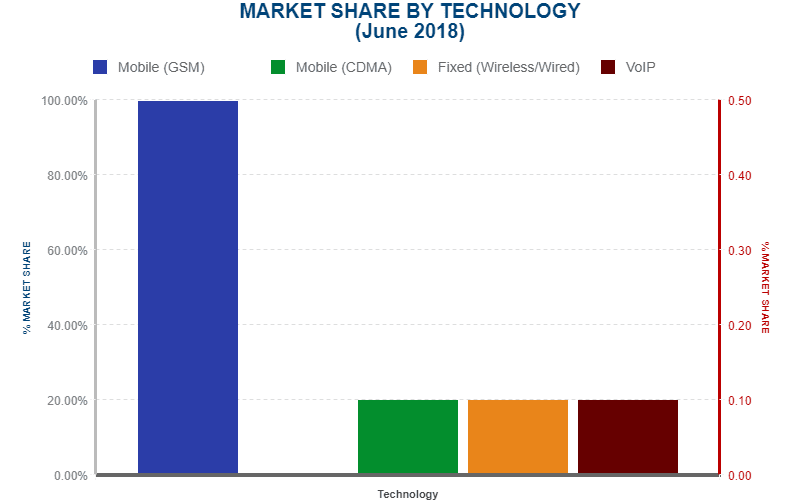There are indications that Nigeria may have lost 347,604 (three hundred and forty-seven thousand, six hundred and four thousand) internet services subscribers in the month of June. This is according to the monthly industry statistics shared by Nigerian Communications Commission (NCC).
Similar read: NCC Report: Mobile Internet Users Hit 103m in May, Steady Increase Show Internet Adoption
According to the report, Nigeria has a total of 102,805,122 Global System for Mobile (GSM) data subscribers in June 2018, a slight reduction (347,604) from the 103,152,726 subscribers recorded in May. This is the first time the number of data subscribers will reduce since when it reduced from 91,274,446 in January 2017 to 89,998,873 in February 2017.

On the other hand, CDMA internet subscribers have stagnated at 30,309 since November 2016. Fixed wireless subscribers increased from 10,328 to 10,449 within the same period. As it stands, the GSM operators still have the largest portion of the internet subscriber share (99.70%). And, MTN is leading the pack.
This implies that 57% of the Nigerian population has access to the internet.
Likely Responsible factors
Although a ready reason for this decline cannot be readily obtained, it is possible that a good number of users migrated to other services providers (especially the VOIP operators i.e. Smile, Swift, Ntel). This is because VOIP subscribers figure appreciated from 321,634 in May 2018 to 345,603 in June 2018.
📈 TOP 15 Countries with the Highest Number of Internet Users
🇨🇳China
🇮🇳India
🇺🇸United States
🇧🇷Brazil
🇮🇩Indonesia
🇯🇵Japan
🇷🇺Russia
🇳🇬Nigeria
🇲🇽Mexico
🇧🇩Bangladesh
🇩🇪Germany
🇵🇭Philippines
🇻🇳Vietnam
🇬🇧United Kingdom
🇫🇷France— Larry Kim (@larrykim) July 25, 2018
Coming from a background of the knowledge that only 35 per cent of Africans have access to the web, compared to 48 per cent in Asia, 67 in Latin America, 85 in Europe, and 95 in North America, these numbers indicate that access to quality data service in Nigeria is still a luxury.
The announcement by Google of the plan to roll out about 200 Google Stations across five cities ( Lagos, Kaduna, Port Harcourt, Ibadan, and Abuja) in the country by 2019 offers a huge respite in the nearest future. This will provide coverage for over 10 million Nigerians across these locations. In itself, these may result in more losses for the Telco service providers.
Excited we're expanding Google Station to Nigeria, helping to make the internet more accessible to everyone with free wifi hotspots rolling out through the next year #GoogleForNigeria https://t.co/7YzJN7Lemx
— Sundar Pichai (@sundarpichai) July 26, 2018
Similar read: #GoogleForNigeria: Google’s New Updates will Deepen Broadband and Smartphone Penetration in Nigeria
Telecoms Now Contributes 9.19% to GDP
The report also indicated that the telecoms industry contributed 9.19% to the Gross Domestic Product (GDP) of Nigeria in Q1 of 2018. This is a significant improvement from the 8.66% it contributed to the GDP in Q4 of 2017.
If the sector is to witness a remarkable improvement and increase this quota, the broadband roadmap of the country needs to be revisited and a rigorous implementation of the actions must begin now.
Honestly, if I have electricity and internet access 24/7 I’d be the most productive version of myself….that’s not too much to ask but in Nigeria that a very tall order 🙄
— Start Up Legal Consulting (@bjspesh) July 28, 2018
When the effort of Google is duplicated rapidly and some critical infrastructural concerns can be swiftly addressed, we will get to the Eldorado faster than we think.






